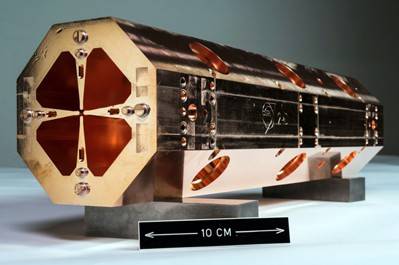Trumpf is strengthening its Additive Manufacturing (AM) division with a complete take over of the joint venture Trumpf Sisma from its Italian partner Sisma. Up to now, Trumpf had held 55 percent of the shares.
In addition, Trumpf will continue Sisma’s Laser Metal Fusion (LMF) business in the industrial, dental and medical markets. The two companies have now signed an agreement to this effect; the transaction is expected to be completed by the end of 2021.Financial terms were not disclosed.
In the context of the sale of the joint venture and its own LMF division, Sisma plans to focus on the jewelry and fashion industry in the future and to distribute LMF machines from Trumpf for these markets.
Trumpf Sisma was founded as a joint venture in 2014 and is based in Schio in northern Italy. Around 60 employees work there in the development and production of metal 3D printing machines featuring laser metal fusion technology.
I.FAST project turns to laser AM
A new generation of particle accelerators aims at taking cancer therapy, drug detection and material analysis to a higher level. These linear accelerators are so compact that they are becoming affordable even for smaller hospitals, airports and laboratories.
 To support this development, the Fraunhofer Institute for Material and Beam Technology (IWS), together with the European Organization for Nuclear Research (CERN) in Switzerland, Latvia’s Riga Technology University (RTU) and Politecnico di Milano (PoliMi), is focusing on laser-based 3D printing.As part of the I.FAST project, aimed at enhancing innovation in accelerator and co-funded by the European Commission’s Horizon 2020 program, researchers have succeeded for the first time to additively manufacture essential quadrupole components for linear accelerators from pure copper.
To support this development, the Fraunhofer Institute for Material and Beam Technology (IWS), together with the European Organization for Nuclear Research (CERN) in Switzerland, Latvia’s Riga Technology University (RTU) and Politecnico di Milano (PoliMi), is focusing on laser-based 3D printing.As part of the I.FAST project, aimed at enhancing innovation in accelerator and co-funded by the European Commission’s Horizon 2020 program, researchers have succeeded for the first time to additively manufacture essential quadrupole components for linear accelerators from pure copper.
They say that this achievement opens up new prospects for commercial production and practical use of such systems, operating on the principle of high frequency radio frequency quadrupoles.
These systems could be used, for example, for better and more automated drug and weapons checks at airports. The scientists see great potential in 3D copper printing. “This approach will allow us to significantly reduce manufacturing times,” commented Samira Gruber, an expert in additive manufacturing of pure copper and copper alloys at Fraunhofer IWS.
Rapid prototyping is expected to become simpler, with the effect of driving the future development of accelerator technology, say the partners. In addition, additive manufacturing can save material and thus reduce the resource consumption of copper compared to classic processes.


